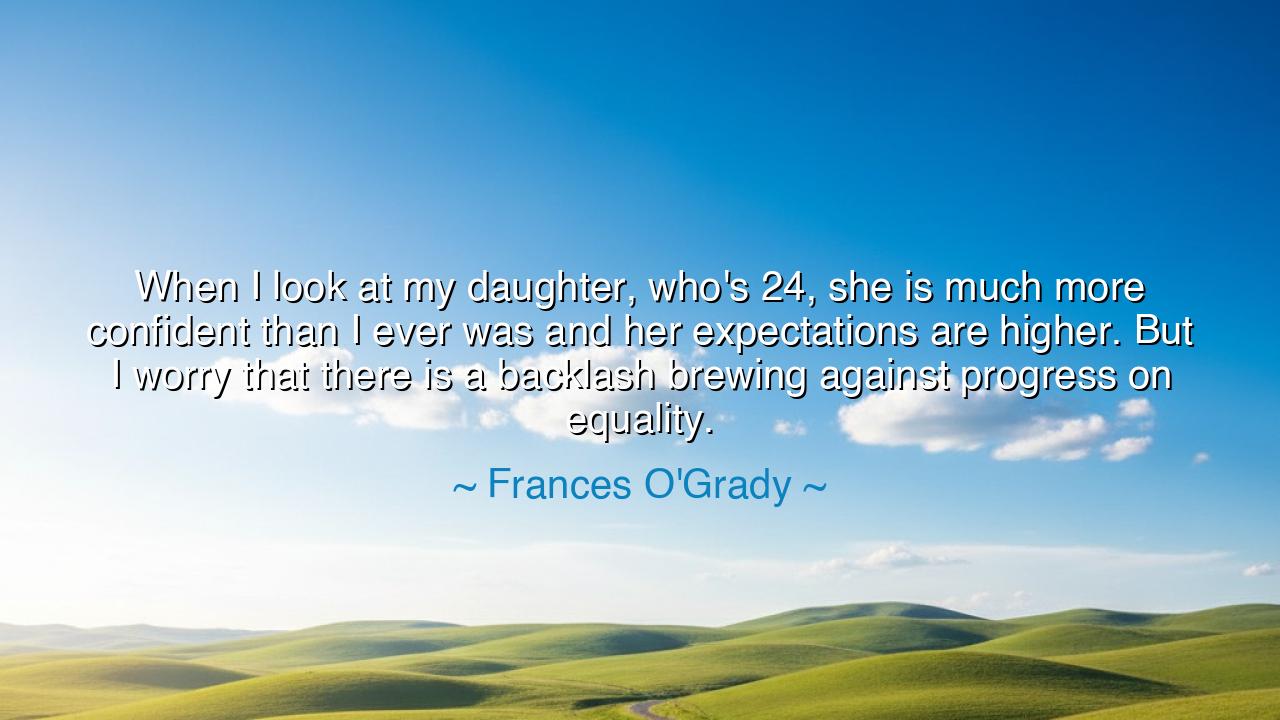
When I look at my daughter, who's 24, she is much more confident
When I look at my daughter, who's 24, she is much more confident than I ever was and her expectations are higher. But I worry that there is a backlash brewing against progress on equality.






When Frances O’Grady said, “When I look at my daughter, who’s 24, she is much more confident than I ever was and her expectations are higher. But I worry that there is a backlash brewing against progress on equality,” she spoke as both a mother and a guardian of her generation’s hard-won victories. Her words rise with pride, yet tremble with warning. They are a reflection of one who has fought for justice and now watches the tides of time, fearing that the waves of progress may begin to recede. In her daughter’s confidence she sees the flowering of what women before her dreamed of; yet in her own heart, she senses the old winds of resistance stirring again.
The origin of this quote lies in O’Grady’s lifelong work as a trade union leader and advocate for workers’ and women’s rights in the United Kingdom. As the first female General Secretary of the Trades Union Congress, she stood at the crossroads of labor and feminism — a voice for fairness in workplaces still shaped by inequality. Her words emerge not from theory, but from the lived experience of struggle: of watching women rise from silence into power, and yet knowing how fragile that ascent can be. In the story of her daughter, she gives form to the eternal struggle between generational hope and historical caution.
O’Grady’s statement reveals a profound truth about the rhythm of history — that every movement toward equality is followed by an answering wave of resistance. The ancients knew this pattern well: progress is not a ladder, but a spiral. It ascends, but it circles back, demanding each generation to reaffirm what their predecessors fought for. When O’Grady speaks of her daughter’s higher expectations, she acknowledges the fruits of a century of feminist struggle — of suffragettes who marched in chains, of workers who struck in defiance, of mothers who refused silence so that their daughters could speak freely. Yet her fear — the backlash — reminds us that no victory is permanent, and that rights unguarded are rights undone.
History provides many echoes of her concern. When women won the right to vote, reactionaries warned of moral decay. When civil rights triumphed, new systems of exclusion arose in subtler forms. When education opened to women, the cry went out that families would collapse. And yet, every act of liberation has been followed by its shadow: the fear of change. O’Grady’s anxiety mirrors that of those who watched the gains of reform threatened by complacency. The lesson is clear — freedom, once achieved, must be defended anew in every era, for power rarely surrenders without seeking to reclaim what it has lost.
And yet, O’Grady’s message is not one of despair. It is, in truth, a call to vigilance. Her daughter’s generation, filled with confidence and ambition, represents the rising dawn — but dawn can fade if not protected. The elder generation must not grow weary, and the younger must not grow careless. Equality, she teaches, is not a gift handed down, but a torch passed forward. The expectations of the young are not entitlement; they are the rightful inheritance of those who fought before them. But this inheritance must be nurtured, renewed, and expanded — not taken for granted.
The heart of O’Grady’s wisdom lies in balance: in hope without naïveté, in progress tempered with remembrance. She knows that movements falter when their children forget the cost of their freedom. To preserve equality, we must teach its history, honor its martyrs, and challenge those who disguise prejudice as tradition. As she looks upon her daughter’s strength, she sees both victory and responsibility — for every generation that rises higher must remember the shoulders it stands upon.
Let this truth be passed to those who come after: progress is not a river that flows unendingly forward, but a garden that must be tended by each generation. Pride in what has been achieved must live alongside awareness of what can still be lost. To the young, O’Grady’s words are a summons — to carry the struggle onward with courage and wisdom. To the old, they are a reminder — to trust that their battles have borne fruit, even as they guard against the frost of regression. And to all, her message endures: that equality is not a destination, but a living covenant between the past and the future — one that must be protected by every beating heart that believes in justice.






AAdministratorAdministrator
Welcome, honored guests. Please leave a comment, we will respond soon